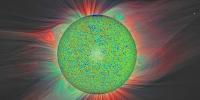Tahar AMARI

Directeur de recherche au CNRS
Equipe de recherche : Théorie des plasmas
| Adresse | CPHT, Ecole Polytechnique, 91128 Palaiseau cedex, France |
| Tél. | 01 69 33 42 52 |
| Fax | 01 69 33 49 49 |
| Contact | prenom.nom@polytechnique.edu |
| Bureau | Bât. 6, pièce 1021 |
Recherches actuelles
- Magnétohydrodynamique (MHD) et Astrophysique
- Physique Solaire : phénomènes eruptifs, chauffage de la couronne, interaction couronne-zone de convection
- Mathématiques Appliquées : existence d’équilibres, schémas numériques pour les problèmes magnétostatiques et d’évolution.
Dernières publications :
Yeates AR, Amari T, Contopoulos I, Feng X, Mackay DH, Mikic Z, Wiegelman T, Hutton J, Lowder C, Morgan H, Petrie G, Rachmeler LA, Upton LA, Canou A, Chopin P, Downs C, Druckmuller M, Linker JA, Seaton DB, Torok T.
Global Non-Potential Magnetic Models of the Solar Corona During the March 2015 Eclipse.
Space Science Reviews. 2018;214(5):UNSP 99.
DOI: 10.1007/s11214-018-0534-1.
Amari T, Canou A, Aly J-J, Delyon F, Alauzet F.
Magnetic cage and rope as the key for solar eruptions.
Nature 2018;554:211-215. Cover paper
DOI:10.1038/nature24671
Communiqué de presse de l'Ecole polytechnique
DeRosa ML, Wheatland MS, Leka KD, Barnes G, Amari T, Canou A, et al.
The Influence of Spatial Resolution on Nonlinear Force-Free Modeling.
Astrophysical Journal 2015;811(2):107.
Amari T, Luciani JF, Aly JJ.
Small-scale dynamo magnetism as the driver for heating the solar atmosphere.
Nature 2015;522:188-191.
Amari T, Canou A, Aly JJ.
Characterizing and predicting the magnetic environment leading to solar eruptions.
Nature 2014;514:465–469. Cover paper
DOI: 10.1038/nature13815
http://www.nature.com/nature/journal/v514/n7523/full/nature13815.html#videos
Amari T, Aly JJ, Canou A, Mikic Z.
Reconstruction of the solar coronal magnetic field in spherical geometry.
Astronomy and Astrophysics 2013;553:A43.
Aly JJ, Amari T.
Self-gravitating body with an internal magnetic field. I. New analytical equilibra.
The Astrophysical Journal 2012;750(1):4.
Aly JJ, Amari T.
Magnetic bubbles and magnetic towers - I. General properties and simple analytical models.
Monthly Notices of the Royal Astronomical Society (MNRAS) 2012;420:237.
Pourquoi l'atmosphère du Soleil est - elle beaucoup plus chaude que sa surface ?

Cette énigme est enfin résolue grâce aux recherches du Centre de Physique Théorique (École polytechnique/CNRS) et du laboratoire Astrophysique, interprétation-modélisation (CNRS/CEA/Université Paris Diderot). Ces résultats sont parus dans la revue Nature du 11 juin 2015.
Article : Small-scale dynamo magnetism as the driver for heating the solar atmosphere, Tahar Amari,Jean-François Luciani, Jean-Jacques Aly. Nature 522, 188–191 (11 June 2015). doi:10.1038/nature14478
